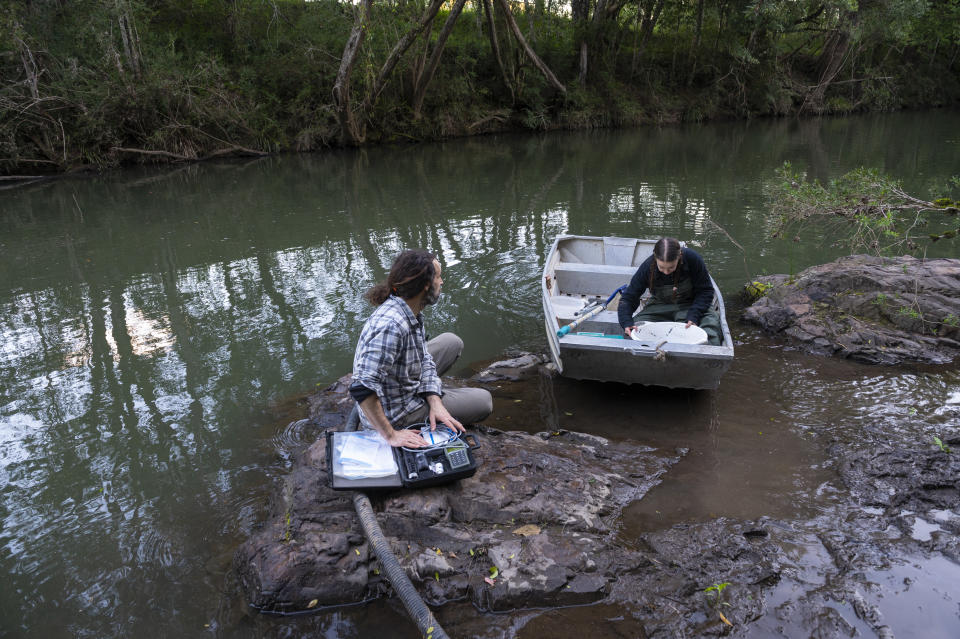'Devastating': Platypus numbers plummet amid growing calls for action
Platypus numbers have suffered a ‘significant decline’ across Australia as urban sprawl displaces another one of Australia’s iconic species.
Locations where the notoriously elusive creatures are found have dropped by 22 per cent over the last 30 years, according to new research from University of NSW.
While the species is listed as ‘near threatened’ on the International Union for Conservation of Nature (IUCN) Red List, it lacks the local protection needed to ensure its survival, conservation groups say.
Observing them in their muddy river habitats is a challenge, so estimates of population size vary widely, however by studying environmental DNA and analysing available records of wild sightings dating back to 1770, researchers have built a picture of their demise.
A lead author of the project, Dr Tahneal Hawke, told Yahoo News Australia that she was particularly struck by a newspaper article from 1908 which chronicled 22 platypus being collected in a single day from the Princess Bridge in Melbourne.
Today, there are thought to be between 1.3 to two adult individuals per kilometre around tributaries of the Yarra River in that area, a “devastating” drop in numbers.
“I'm quite sad to see the results of an animal that we've been actively working with, and trying to promote the conservation of, for the last four years,” Dr Hawke said.
“But it's not just the platypus that this is happening to, it’s happening to a lot of our iconic mammals.”
Urgent endangered listing required to save platypus, researchers say
Dr Hawke has concluded platypus must be “urgently listed” by the Federal Government as a nationally threatened species.
This call has been backed by the Australian Conservation Foundation (ACF), who funded the study, as well as WWF-Australia and Humane Society International (HSI), who collaborated on it.

Last week in Victoria, where sightings have dropped by 65 per cent in parts of greater Melbourne, the Victorian Scientific Advisory Committee recommended that the species be listed as vulnerable in that state, after a recommendation was made by wildlife photographer Doug Gimesy.
In South Australia, they are already listed as endangered.
Dr Paul Sinclair from ACF said that while environmental laws in Australia “should be much stronger”, federal protection could see the species put on a path to recovery.
This was echoed by Evan Quartermaine from HSI who said there is “no time to waste” in rolling out protection.
‘Really good position’ to act now and save species
Platypus face an “increasing number and intensity of threats” across the country including land clearing, habitat fragmentation, fox and dog attacks, pollution and the modification of fresh water rivers.
Another killer, are the much maligned opera house nets, which are dropped in rivers to catch yabbies, but often claim the lives of platypus instead.
The curious animals are known to swim inside the nets in search of food where they become trapped and drown.
Banned in Victoria, they continue to be sold in NSW and Queensland, the two states which have seen the most rapid decline in sightings.

Like the koala, which is on track to be extinct in the wild in NSW by 2050, platypus are being affected by the frequency and duration of droughts due to climate change.
In NSW, the large fish kills documented over the summer are clear evidence that our rivers are drying up and platypus numbers are suffering, particularly in the western rivers of the Murray Darling Basin.
'Making us sick inside': Gas project will destroy sacred site, Indigenous elders fear
'How the hell?' Disturbing truth behind photos of koalas in suburbia
Staggering bushfire report reveals government's 'horrifying' effort to save wildlife
Despite the perils faced by the platypus, Dr Hawke believes that Australia is in a great position to reverse the decline.
“With the platypus, we are seeing ongoing steady decline, but they're not at the point of no return yet,” Dr Hawke said.
“I think we're in a really good position, that if we implement changes to how we're managing our natural environment, then we can really improve the conservation of the species.”
Do you have a story tip? Email: newsroomau@yahoonews.com.
You can also follow us on Facebook, Instagram and Twitter and download the Yahoo News app from the App Store or Google Play.



